How to Use Parent Training to Support Autism Interventions
Empowering Families Through Effective Parent Training in Autism Support

Understanding Parent Training and Its Role in Autism
Parent training is an essential component in supporting children with autism spectrum disorder (ASD). It provides caregivers with the tools, strategies, and knowledge necessary to actively participate in their child's developmental journey, fostering better outcomes, consistency across environments, and stronger parent-child relationships. This article explores the core principles, methods, approaches, and evidence supporting parent training as a vital element of autism interventions.
Defining Parent Training and Core Principles
What is parent training and its core principles?
Parent training is a structured process designed to equip caregivers with evidence-based strategies, primarily derived from Applied Behavior Analysis (ABA), to support their child's development—especially for children diagnosed with autism spectrum disorder (ASD). The goal is to empower parents to actively participate in their child's intervention, fostering growth across different environments.
The core principles of parent training include understanding fundamental ABA concepts such as reinforcement, prompting, shaping, and generalization. Reinforcement involves rewarding desired behaviors to increase their occurrence, while prompting encourages the child to perform targeted actions, gradually fading as independence grows. Shaping involves reinforcing successive approximations of the desired skill, gradually guiding the child toward the target behavior. Generalization ensures that skills learned in one setting or with one person are transferred and useful across various contexts.
Implementing practical techniques is also central. These include using visual supports to aid understanding, positive reinforcement for desirable behaviors, and establishing consistent routines to provide predictability. Training sessions often emphasize hands-on learning, where parents practice strategies under supervision, enabling immediate feedback and skill refinement.
Effective parent training programs are personalized, setting individualized goals that align with each child's unique needs. Continuous support from therapists helps parents troubleshoot challenges and maintain consistency at home. Collaboration between parents and therapists ensures strategies are seamlessly integrated into daily routines and adapted as the child's skills evolve.
The ultimate aim of parent training is to build parents’ confidence and competence, ensuring that therapy principles are sustained outside clinical settings. This ongoing involvement not only reinforces skill acquisition and behavioral improvements but also fosters stronger parent-child relationships and reduces family stress. When parents are well-prepared and supported, they become vital partners in their child's long-term development and success.
How Parent Training Supports Autism Interventions and Therapy
How can parent training support autism interventions and therapy?
Parent training plays a vital role in enhancing autism interventions by equipping parents with the tools they need to support their child's development effectively. It empowers parents to become active participants in their child's therapy, leading to more consistent and meaningful progress.
Support components such as psychoeducation and care coordination are foundational. Psychoeducation provides parents with current information about ASD, helping them set realistic expectations, advocate for their children, and better understand their child's needs. Care coordination involves organizing access to medical, developmental, and behavioral services, often through case managers, ensuring families navigate the complex service landscape successfully.
Beyond support, skills-based interventions are central to parent training. Programs like JASPER and ESDM teach parents specific strategies to promote social interaction, communication, imitation, and play skills. These programs involve therapist coaching during naturalistic activities, enabling parents to effectively transfer learned skills into everyday settings. For example, JASPER focuses on joint attention and play in preschoolers, enhancing engagement and social development.
Research indicates that parent training can significantly improve children's behaviors, including reducing disruptive tantrums and aggression, and fostering functional communication. It also benefits parents by decreasing stress and improving confidence, creating a nurturing environment conducive to ongoing growth.
Overall, incorporating parent training into autism therapy strengthens treatment outcomes by promoting skill generalization, increasing parental involvement, and supporting the child's development across different environments.
Diverse Approaches and Programs in Parent Training
What approaches or programs are available for parent training in autism support?
Parents seeking support for children with autism have access to a variety of programs designed to equip them with skills, knowledge, and strategies. Some of the most recognized structured programs include the UCLA Young Autism Project, the Early Start Denver Model (ESDM), and Incidental Teaching. These programs focus on teaching parents how to promote social skills, communication, and functional behaviors through specific coaching techniques and naturalistic activities.
The UCLA Young Autism Project provides comprehensive training for parents in implementing pivotal response techniques that enhance motivation and social interaction. The ESDM combines developmental and behavioral methods, fostering shared engagement between parent and child while promoting developmental growth. Incidental Teaching emphasizes spontaneous teaching moments within everyday routines to encourage communication and learning.
In addition to these programs, numerous organizations offer valuable resources and training opportunities. Autism Speaks, for example, provides educational materials, webinars, and parent toolkits. The Stanford Autism Center offers caregiver skills training, including programs like the World Health Organization’s Caregiver Skills Training (CST), which teaches parents practical strategies for managing challenging behaviors and supporting development.
Community-based activities further support families through parent support groups, classes, and workshops. Many of these are accessible online, making it easier for parents to participate regardless of location. Online platforms such as 'ASD Strategies in Action' provide parents with educational videos, articles, and interactive resources that reinforce effective parenting techniques.
Programs like 'Incredible Years' cater specifically to parents of young children with autism, focusing on emotional regulation, social skills, and reducing parental stress. These curricula emphasize family involvement, real-life skill practice, and improving parent-child relationships.
In summary, a wide array of programs—ranging from structured, therapist-led models to community activities and online resources—supports parents in developing the skills needed to facilitate their child's growth and manage challenges associated with autism.
Methods and Techniques in Parent Training for Autism
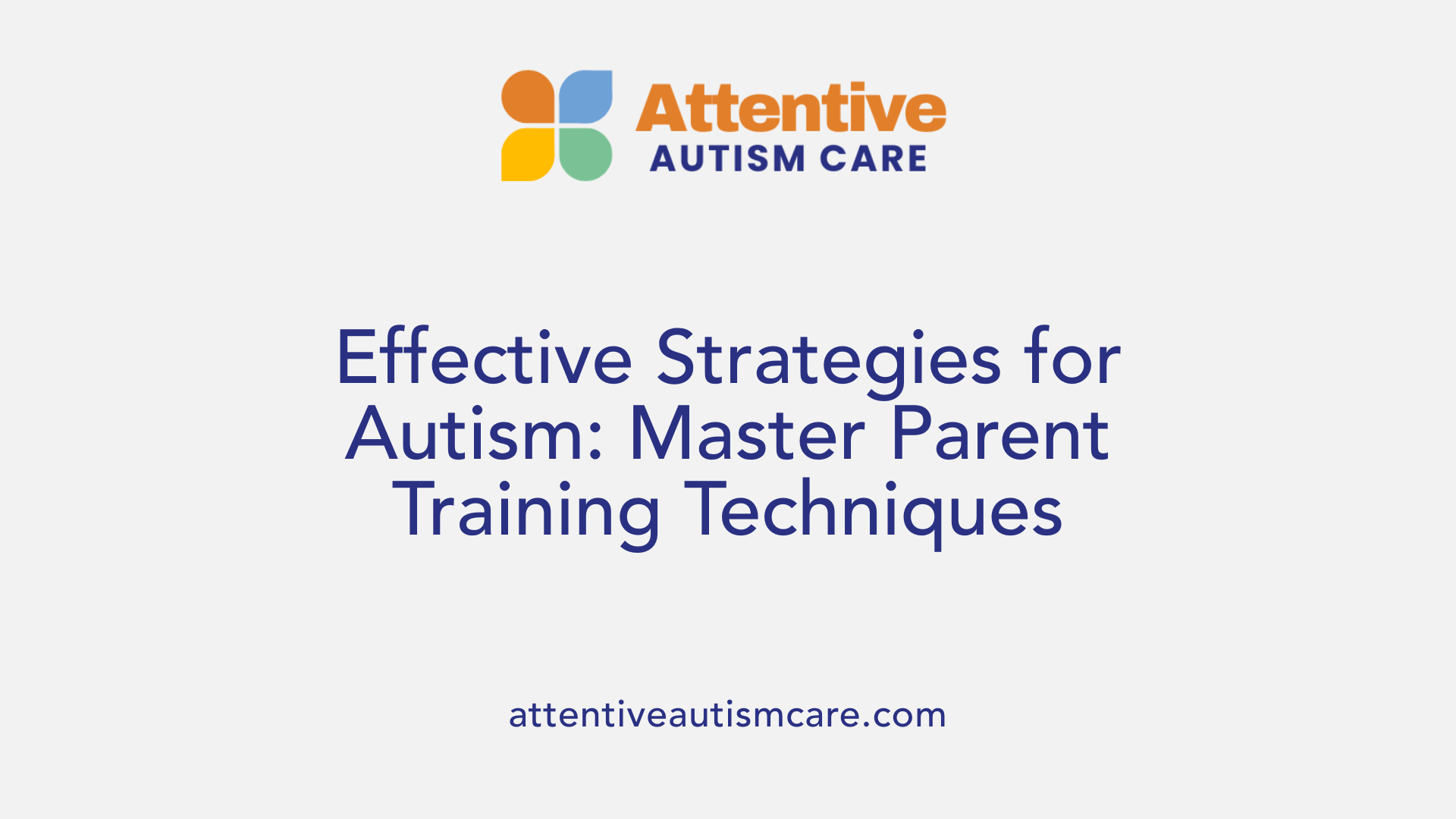 Parent training programs for autism spectrum disorder utilize a variety of approaches designed to enhance parental skills, support early intervention, and improve child outcomes.
Parent training programs for autism spectrum disorder utilize a variety of approaches designed to enhance parental skills, support early intervention, and improve child outcomes.
One of the most prominent methods is the use of behavioral strategies derived from applied behavior analysis (ABA). These techniques include positive reinforcement to motivate desirable behaviors, prompting to guide responses, and shaping to gradually develop complex skills. Such strategies are effective in reducing maladaptive behaviors like tantrums and aggression, while promoting communication, play, and social skills.
Psychoeducational approaches play a vital role in parent training. They aim to improve parents' understanding of autism, helping them navigate healthcare and educational services more efficiently. Through structured sessions and educational resources, parents learn about specific autism challenges, which enables them to adjust expectations and advocate effectively for their children.
Parent-mediated interventions are increasingly popular, with programs like JASPER, ESDM, and DIR/Floortime emphasizing active parental involvement. JASPER (Joint Attention, Symbolic Play, Engagement, and Regulation) targets foundational social skills such as joint attention and play, using structured coaching and naturalistic activities. ESDM (Early Start Denver Model) combines developmental and behavioral techniques, involving parents in shared engagement strategies to foster communication and social skills. DIR/Floortime focuses on emotional development by encouraging parents to facilitate their child's social and emotional growth through play-based interactions.
Support tools also enhance parent training outcomes. Visual strategies, such as picture schedules and social stories, help children understand routines and expectations. Establishing consistent routines creates a stable environment conducive to learning and reduces family stress. Structured training sessions and workshops further equip parents with practical skills, while online resources—like videos, webinars, and educational websites—provide accessible support outside formal sessions.
Collectively, these methods empower parents to be active participants in their child's development. When parents are well-trained, they can reinforce therapeutic strategies, assist in generalizing skills across settings, and strengthen parent-child relationships. Ongoing support and education contribute to improved family functioning and better long-term outcomes for children with autism.
| Approach | Techniques/Tools | Focus Area |
|---|---|---|
| ABA-based Strategies | Positive reinforcement, prompting, shaping | Behavior reduction and skill acquisition |
| Psychoeducational Methods | Structured sessions, informational resources | Understanding autism, navigating services |
| Parent-mediated Interventions | JASPER, ESDM, DIR/Floortime | Core symptom improvement, social and communication skills |
| Support Tools | Visual schedules, routines, social stories | Consistency, reducing family stress, fostering independence |
In summary, parent training leverages a blend of behavioral techniques, educational support, targeted interventions, and practical tools to empower parents. This comprehensive approach not only impacts individual behaviors but also fosters a supportive environment that promotes long-term development in children with autism.
Benefits and Outcomes of Parent Training in Autism Support
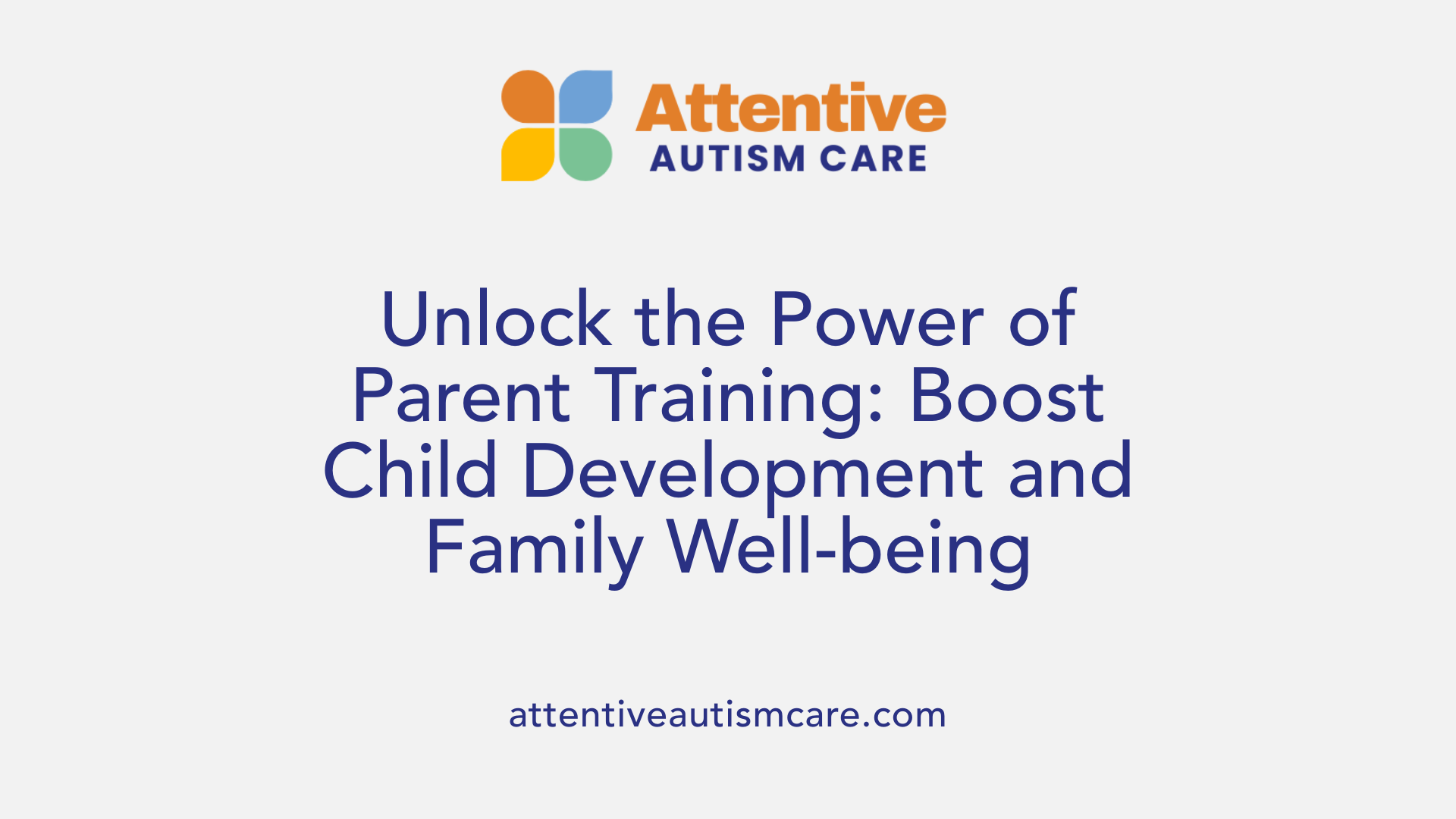
What are the benefits and potential outcomes of parent training in autism interventions?
Parent training plays a vital role in supporting children with autism spectrum disorder (ASD) and their families. One of the most notable benefits is the improvement in children’s behaviors, particularly in enhancing social skills such as eye contact, joint attention, and communication. Additionally, parent training is effective in reducing challenging behaviors, including tantrums, aggression, and property destruction.
Empowering parents with knowledge and practical strategies increases their confidence and competence in managing daily challenges. This active involvement enables consistent application of therapeutic techniques across various settings, which is critical for skill generalization and long-term progress.
Research shows that families practicing parent-mediated interventions often experience decreased stress levels and improved family dynamics. When parents are trained to incorporate behavioral principles, they can better support their child's development and promote positive interactions.
Moreover, parent training can lessen reliance on medication by providing non-pharmacological methods to address behavioral issues, fostering more natural and sustainable progress. Parents learn to incorporate interventions into everyday routines, enhancing the child's functional communication and independence.
Despite promising outcomes, variations in program approaches highlight the importance of standardization and high-quality research. More extensive studies are needed to understand the long-term effects and economic benefits of parent training programs.
In summary, parent training enhances behavioral and developmental outcomes for children with ASD, boosts parental confidence, and improves overall family functioning, making it an essential component of comprehensive autism support.
Supporting Research and Evidence for Parent Training Efficacy
What is the evidence supporting the effectiveness of parent training in autism support?
Research consistently demonstrates that parent training programs are effective tools in managing autism spectrum disorder (ASD), benefiting both children and their parents. Multiple meta-analyses and randomized controlled trials (RCTs) have provided empirical support for these interventions.
Meta-analyses of various studies, including 17 papers from 15 different studies, indicate that parent training tends to produce positive effects on children with ASD. Common improvements include enhanced social interaction, improved communication skills, and reductions in problematic behavioral issues. For instance, interventions like DIR/Floortime, Pivotal Response Treatment, and Parent-Focused Training showed small to moderate beneficial effects.
RCTs, such as the RUPP Autism Network study, have demonstrated that parent coaching rooted in applied behavior analysis (ABA) principles can significantly decrease disruptive behaviors like tantrums, aggression, and property destruction. These studies also reveal that trained parents become more confident and competent in implementing strategies, which leads to better generalization of skills across various settings.
In addition, research highlights that parent training can improve parental well-being by reducing stress, anxiety, and depression. Programs incorporating mindfulness and stress-reduction techniques have shown promise in supporting parental mental health. For example, the 'Blue Hope' program, a culturally tailored initiative, has shown that accessible, community-based parent training can produce sustained positive outcomes, particularly in low-resource environments.
Behavioral and developmental improvements
Parent training has been linked to measurable improvements in children's socialization, communication, and behavioral regulation. Studies illustrate that children benefit from increased imitation, functional communication, and compliance with requests. Moreover, targeted training reduces maladaptive behaviors such as tantrums and aggression, facilitating better parent-child interactions.
Impact on parental mental health
Enhanced parental confidence and reduced stress levels are significant outcomes of parent training programs. These interventions help parents better understand their child's needs and equip them with practical skills, which fosters more positive relationships and a supportive family environment.
Limitations and need for further research
Despite encouraging findings, the variability among existing studies makes it difficult to draw definitive conclusions about the long-term effects of parent training. Small sample sizes, differences in intervention methods, and inconsistent outcome measures highlight the need for standardized protocols. There is an urgent call for large-scale, high-quality RCTs to evaluate the clinical and economic benefits of these programs. Future research should also explore how parent training can be optimized to enhance independence and self-help skills in children with ASD.
Enhancing Parent Confidence and Family Dynamics
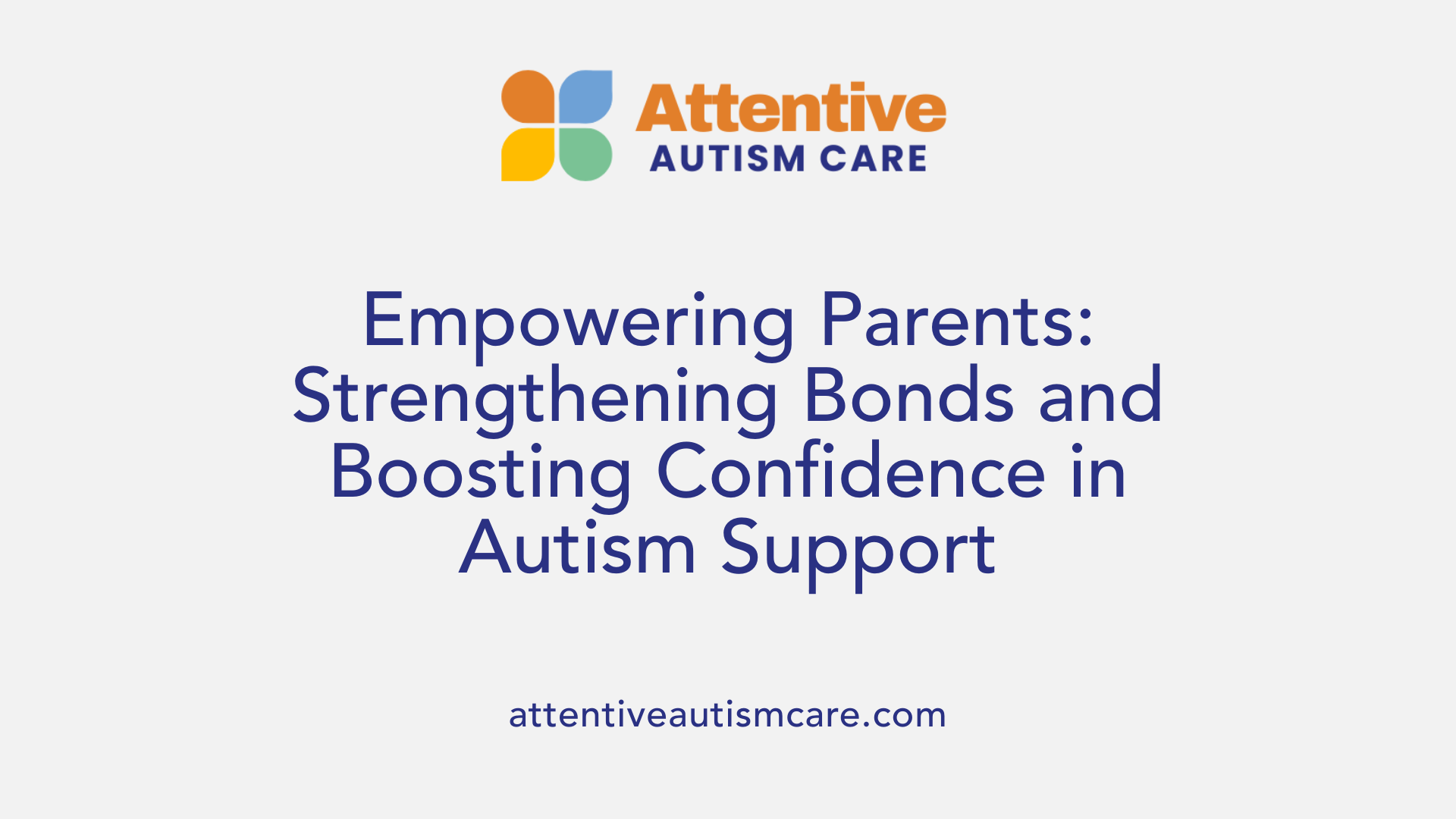
How does parent training influence parental confidence and family dynamics?
Parent training plays a vital role in boosting parental confidence. When caregivers learn effective strategies for managing behaviors and supporting their child's development, they feel more equipped and less overwhelmed. This increased ability to handle daily challenges fosters a sense of mastery and control.
As parents become more confident, their interactions with their children tend to become more positive and responsive. This strengthens the emotional connection and helps in building stronger parent-child bonds. Engaged and confident parents are more likely to participate actively in their child's interventions and daily activities, which supports the child's social and communication skills.
In addition to improving parent-child relationships, parent training can significantly reduce family stress and anxiety. By providing practical tools, information, and support networks, these programs help families navigate complex situations with less frustration. Family members often report feeling more capable of coping with the demands of autism, leading to a calmer and more stable home environment.
The cumulative effect of increased confidence, improved bonds, and reduced stress contributes to long-term family benefits. Families that develop resilient, communicative, and supportive dynamics are better positioned to adapt and thrive over time. Such environments nurture the child's growth, promote ongoing developmental progress, and help establish a foundation of mutual understanding and cooperation within the family unit.
Research suggests that these positive changes are not only short-term but can have lasting impacts, fostering a healthier, more cohesive family life and enhancing the overall well-being of everyone involved.
For more insights, exploring the impact of parent training on family well-being reveals how empowering parents helps create nurturing environments where children with autism can flourish and families can function more harmoniously.
Community and Support Structures for Parents of Children with Autism
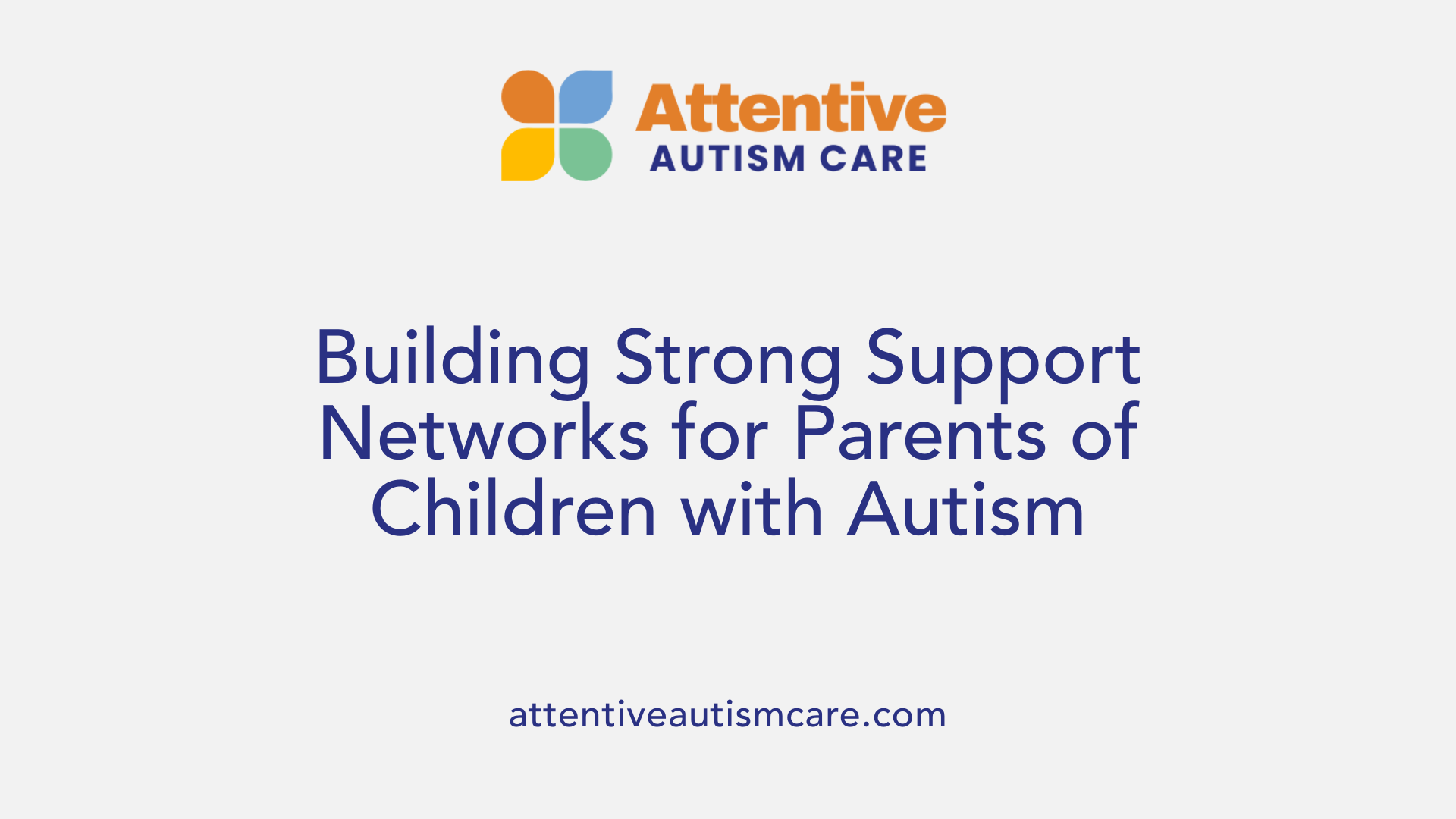
How do community resources and support structures enhance parent training and engagement?
Community resources and support systems are essential for empowering parents of children with autism. They provide ongoing assistance and foster a sense of belonging, which is often vital given the challenges of caring for a child with ASD.
Support groups are a cornerstone of these resources. They enable parents to connect with peers who understand their experiences. Sharing stories, strategies, and emotional support helps reduce feelings of isolation and provides practical insights into managing daily challenges.
Online educational resources further enhance parent training. Access to webinars, articles, videos, and interactive platforms allows parents to learn at their own pace and revisit materials as needed. This flexibility helps parents stay informed about the latest interventions and techniques.
Community-based interventions also play a significant role. Local workshops, training sessions, and intervention programs encourage parents to participate directly in skill-building activities. These programs foster hands-on learning and create opportunities for active engagement, making training more effective and relevant.
Together, these community structures boost parental confidence and motivation. They also help sustain the strategies learned through formal training sessions, promoting consistency in implementing behavioral interventions at home.
Ultimately, community and support networks foster stronger caregiver communities, improve family functioning, and enhance outcomes for children with ASD by ensuring parents do not feel isolated and are equipped with the necessary knowledge and skills.
| Support Type | Purpose | Examples | Impact |
|---|---|---|---|
| Parent support groups | Peer networking and emotional support | Local meetups, online forums | Reduce isolation, share strategies |
| Educational resources | Flexible and accessible learning | Webinars, videos, articles | Keep parents informed, enhance skills |
| Community interventions | Hands-on training and participation | Workshops, local training programs | Foster engagement, practical skill development |
| Overall benefit | Strengthen parent engagement and confidence | Community events, seminars | Better implementation of strategies, improved outcomes |
Personalizing Parent Training for Effective Outcomes
Why is personalized parent training important in autism support?
Personalized parent training plays a vital role in supporting children with autism spectrum disorder (ASD) and their families. Because every child with ASD has unique strengths, challenges, and developmental pathways, tailoring interventions ensures that strategies are relevant and effective. When training programs are customized, parents are more engaged because the content directly addresses their child's specific needs, making the learning process more meaningful and applicable.
Incorporating cultural competence is another essential aspect of personalization. Respecting families' diverse backgrounds, values, and languages helps make training sessions more accessible and trustworthy. Families tend to participate more actively when they feel their cultural context is understood and respected, which can lead to better adherence and outcomes.
Assessment-driven goal setting further enhances the effectiveness of parent training. Regular evaluation and data collection on the child's progress help set realistic, meaningful goals. These ongoing assessments allow caregivers and professionals to adjust strategies, ensuring that interventions remain aligned with the child's evolving needs.
To accommodate different situations and learning preferences, flexible training models are employed. Options such as online modules, workshops, one-on-one coaching, and hybrid approaches offer families choices that fit their schedules and learning styles. This adaptability increases the likelihood of sustained participation and long-term success.
In sum, personalizing parent training by focusing on individual needs, cultural considerations, evidence-based goals, and flexible delivery methods significantly improves the support provided to children with ASD. It empowers families, enhances the effectiveness of interventions, and promotes positive developmental outcomes.
The Future Directions in Parent Training Research and Practice
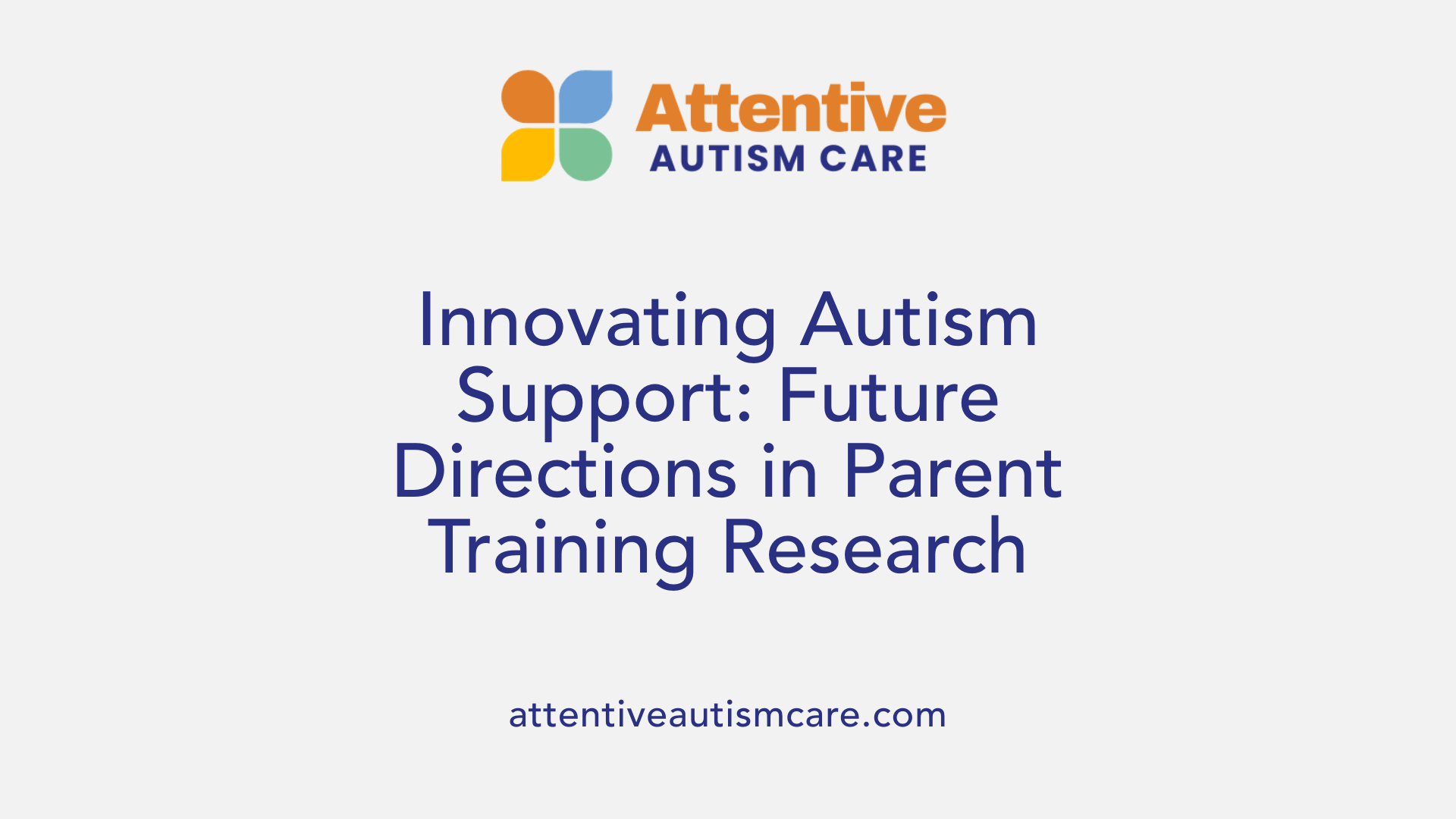
What are the future directions and needs in parent training research and practice?
Advances in parent training for children with autism spectrum disorder (ASD) are moving toward greater standardization and broader research efforts. Currently, the variety of interventions, control groups, and outcome measures makes it challenging to draw definitive conclusions about the most effective strategies. To address this, there is a pressing need for large-scale randomized controlled trials (RCTs) that can provide more robust evidence on both clinical benefits and economic aspects.
Emerging technology plays a vital role in shaping the future. Telehealth platforms, mobile applications, and virtual coaching are increasingly used to deliver parent training, expanding access to families in remote or underserved areas. These tools can be tailored to individual needs, offering flexible learning environments that fit into busy family schedules.
In addition to refining delivery methods, new models of parent training are being developed. These models often incorporate behavioral techniques, developmental frameworks, and neurobiological insights, aiming for a more holistic approach. Such integration may improve the effectiveness of interventions for core symptoms like social interaction, communication, and adaptive behaviors.
Long-term assessments are crucial for understanding the sustained impact of parent training programs. Research needs to focus not only on immediate behavioral improvements but also on how these changes influence broader developmental and family outcomes over time. This includes evaluating gains in independence, social skills, and overall family quality of life.
To maximize the positive impact of parent training, future research will also need to focus on promoting equity. This involves ensuring culturally appropriate materials, accessible formats, and support systems that address diverse family needs. Ultimately, ongoing innovations and rigorous evaluation will help refine practices, making them more effective, accessible, and sustainable for families navigating autism spectrum disorder.
Building a Collaborative Network for Parent Training Success
How can collaborative efforts enhance parent training and autism support?
Effective autism support and parent training significantly benefit from the active collaboration of diverse professionals and community resources. Multidisciplinary teams—including healthcare providers, therapists, educators, and community organizations—work together to create a cohesive network that addresses each child's unique needs.
This collaborative approach ensures that strategies used are consistent and comprehensive, reducing confusion and conflicting advice for parents. When professionals share knowledge and insights, they can design tailored interventions that promote better developmental outcomes.
Integrating community and healthcare systems improves access to necessary services, streamlines coordination, and minimizes delays in support. It fosters a family-centered mindset, where caregiver priorities and family dynamics are respected and actively incorporated into intervention plans.
Moreover, training professionals across various disciplines on parent training principles enhances their ability to support families accurately and empathetically. This not only boosts the quality of guidance provided but also promotes advocacy and resource sharing.
Building a well-connected network encourages parents to access peer support, share experiences, and remain engaged in ongoing learning. Such an environment nurtures continuous improvement in service delivery, empowering caregivers and ensuring children with autism receive holistic, effective interventions.
| Aspect | Description | Impact |
|---|---|---|
| Multidisciplinary Collaboration | Coordination among healthcare, therapy, and education professionals | Consistent and tailored intervention strategies |
| Community and Healthcare Integration | Seamless access to services and resources | Reduction of redundancies, quicker support |
| Family-Centered Approaches | Respect for family priorities and involvement | Increased caregiver confidence and participation |
| Professional Training | Educating support professionals in parent training techniques | Enhanced support quality and advocacy |
By fostering these collaborative efforts, communities can create supportive environments where parents are empowered, and children’s developmental trajectories are optimized.
The Importance of Ongoing Support and Education for Parents
Why is ongoing support and education important in parent training for autism?
Ongoing support and education play a crucial role in maintaining and enhancing the skills parents acquire during initial training sessions. Autism is a dynamic condition, and as children grow, their needs and behaviors evolve. This makes it essential for parents to stay informed and adaptable.
Refresher training sessions help parents revisit core strategies, refine their techniques, and address any uncertainties. These follow-up sessions are essential for reinforcing existing skills and ensuring they are applied effectively in everyday situations.
Workshops, seminars, and booster sessions serve to introduce new insights, evidence-based practices, and innovative intervention techniques. They offer opportunities for parents to deepen their understanding of autism and to learn how to modify their approach as their child develops.
Having access to the latest educational materials—such as articles, videos, and online resources—ensures parents remain current on advances in autism research. Staying informed enables them to implement strategies that are backed by the most recent evidence, leading to better outcomes for their children.
Peer support groups and mentorship programs foster a supportive community where parents can share experiences, exchange advice, and provide emotional support. These interactions boost resilience, reduce feelings of isolation, and motivate caregivers to persist with intervention efforts.
Overall, continuous education and support empower parents to navigate the ongoing challenges of autism. They help sustain initial progress, adapt strategies to new developmental stages, and build a resilient, informed caregiver network.
How do these ongoing support methods contribute to better outcomes?
Regular follow-up activities and community involvement not only reinforce learning but also boost parents' confidence. This confidence translates into more consistent and effective application of intervention techniques at home.
By staying updated, parents can better advocate for their children in educational and healthcare settings, ensuring they receive comprehensive support.
Furthermore, ongoing training helps reduce parental stress and prevent burnout by providing tools to handle complex behaviors and developmental changes.
In essence, continuous support and education for parents are vital components that sustain the benefits of early intervention and foster long-term developmental progress in children with autism.
Harnessing the Power of Parent Training for Lasting Change
Effective parent training is a cornerstone of comprehensive autism support, enabling caregivers to become confident, informed, and active partners in their child's development. Through tailored programs that incorporate evidence-based methods, community involvement, and ongoing education, parents can foster meaningful improvements in behavior, communication, and social skills. As research continues to evolve, embracing innovative approaches and fostering collaboration among professionals will be essential to maximize long-term outcomes. Ultimately, empowering parents through sustained support and education creates a more inclusive, responsive, and hopeful environment for children with autism and their families.
References
- Parent Training in Autism Spectrum Disorder: What's in a Name?
- Parent Training Interventions for Toddlers with Autism Spectrum ...
- Parent Training - Association for Science in Autism Treatment
- Parent Training and Support in ABA Therapy for Children with Autism
- The effectiveness of parent training for children with autism spectrum ...
- The Ultimate Guide to Parent Training in ABA
- Parent Training in ABA: Strategies for Autism Support
- How Parent Training Supports Children with Autism
- ABA Parent Training Programs for Children with Autism
- Parent/Child Education & Training | Stanford Autism Center




































































































